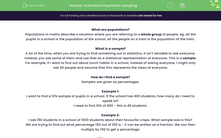What are populations?
Populations in maths describe a situation where you are referring to a whole group of people. eg. all the pupils in a school is the population of the school, all the people on a train is the population of the train.
What is a sample?
A lot of the time, when you are trying to find something out in statistics, it isn't sensible to ask everyone. Instead, you ask some of them and use that as a statistical representation of everyone. This is a sample.
For example, if I want to find out about lunch habits in a school, instead of asking everyone, I might only ask 50 people and assume that this represents the views of everyone.
How do I find a sample?
Samples are given as percentages.
Example 1:
I want to find a 10% sample of pupils in a school. If the school has 400 students, how many do I need to speak to?
I need to find 10% of 400 - this is 40 students.
Example 2:
I ask 150 students in a school of 1000 students about their favourite crisps. What sample size is this?
We are trying to find out what percentage 150 out of 100 is - it can be written as a fraction. We can then multiply by 100 to get a percentage:
|
x | 100 | = | 15% |
Primary vs secondary data
This sounds more complicated than it is. Primary data is simply data you have collected yourself (eg. questionnaire or survey), secondary data is data you have found somewhere else (eg. house prices)
Bias
Sometimes, if you are collecting primary data, you can introduce a bias (unfairness).
For example, if you asked people coming out of a gym how long they spend exercising in a week, this is biased because you are not asking people who don't exercise.
If you wanted to find out the favourite subjects of pupils in a school, you would have to ask the same number of boys as girls to make it fair.
Let's move on to some questions.








